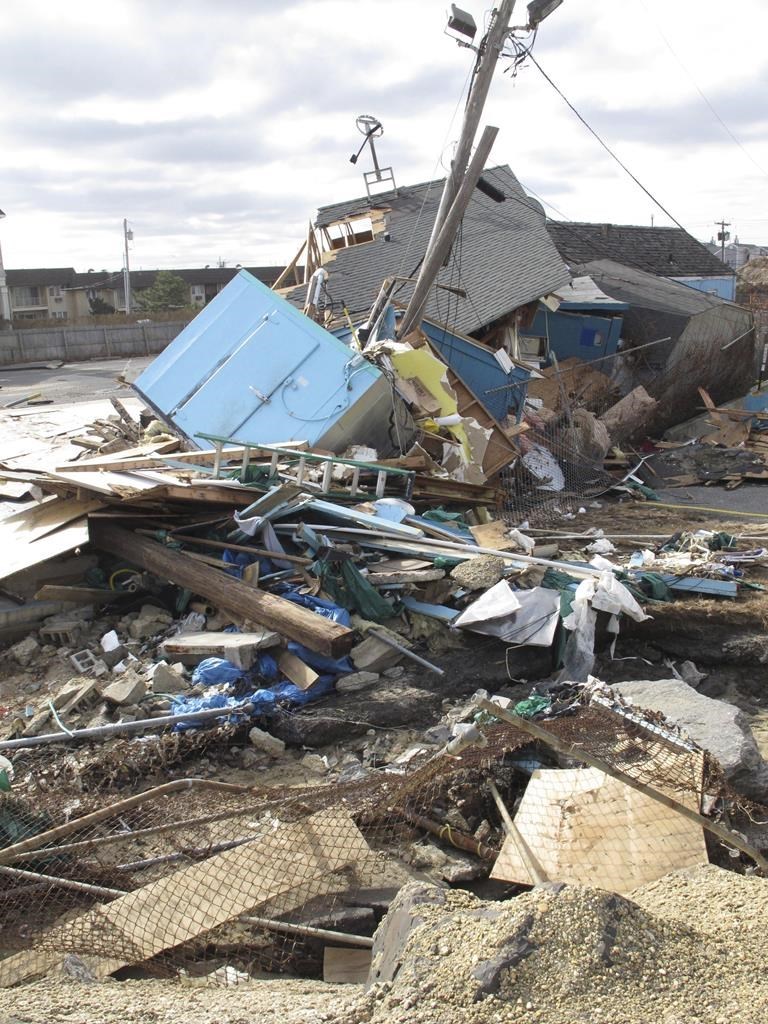MIDDLETOWN, N.J. (AP) — Governments, organizations and businesses have set ambitious goals to combat climate change. But it is far from clear that those goals can be met without forcing people to do -- or not do -- certain things.
And that is causing some consternation, even among some people who acknowledge the need to slow the warming of the planet.
This week, New Jersey has gone into more detail about its climate change goals, including its proposed ban on the sale of new gasoline-powered vehicles by 2035, and a push to “decarbonize” public and private buildings by switching from natural gas to electric heating and appliances.
It's part of an effort by the Democrat-controlled state to reduce its emissions of planet-warming greenhouse gases by 80% by 2050.
Shawn LaTourette, New Jersey's environmental protection commissioner, hesitates to use the word “mandate” in describing the state's plans.
“There are interests out there that tune into the narrative of heavy-handed government forcing people to do things,” he said. “That is not what is happening.”
On Thursday, his agency held an online public hearing about its plan — required by state law — to adopt California's Clean Cars policy requiring car dealers to phase out the sale of internal combustion vehicles and end them by 2035.
And while nothing would stop someone from buying a new gasoline-powered car in another state and bringing it to New Jersey, or continuing to own and drive a gas-powered car they already own or purchase a used one, the move drew fire.
John Burzichelli, the New Jersey Assembly's former deputy speaker, opposes the move as a mandate.
“I can tell you that the tone of New Jersey residents when they hear the word ‘mandate,’ whether it be for the potential of gas stoves in their homes or how an automobile will be propelled, ‘mandate’ is a word that concerns them," said Burzichelli, a Democrat currently running for the state Senate.
His family has two cars — one electric and one gas-powered.
“That's a choice I made,” he said. "I think the marketplace will dictate what people buy.”
Ray Cantor, with the New Jersey Business and Industry Association, also decried “mandates” regarding gas-powered vehicles, saying the cost of a car woul be pushed beyond beyond the menas of many in the middle class, not just low-income people.
“We should not be telling people, as California is, that your only solution if you are a low or moderate-income person, is to ride-share, or buy a bike or hope there will be an (electric) bus in your neighborhood," he said.
Many of the world's countries signed the Paris climate accords, obligating them to reduce greenhouse gas emissions to certain levels.
Yet actions taken thus far are not nearly enough to meet the goal of holding the increase in global average temperatures to below 2°C above pre-industrial levels. China and India, two of the biggest greenhouse gas emitters after the U.S., have pledged to reduce emissions, but still rely heavily on coal-fired power generating plants.
On Wednesday, British Prime Minister Rishi Sunak announced a five-year delay in banning new gas and diesel cars that was due to begin in 2030, citing the “unacceptable costs” of those climate goals on ordinary people.
In the U.S., states including Vermont, Rhode Island, Massachusetts, Connecticut, and Maine have adopted climate laws, and legislation is pending in Michigan.
Anjuli Ramos, New Jersey director of the Sierra Club, agreed that meeting climate goals requires urgent action. But she said New Jersey's steps are "not really a mandate.”
“This is us transitioning to where the market is already going,” she said. “It's not like the car police are going to go up and down the street taking away every gasoline-powered vehicle."
New Jersey banned single-use plastic bags at grocery and other stores in 2022, a step unpopular with many consumers but one environmentalists say drastically reduced pollution. Some environmental mandates like banning certain air condition coolants and lead in gasoline were once controversial but now are accepted.
New Jersey is also moving to “decarbonize” buildings by incentivizing a switch from gas-fired furnaces and stoves to electric appliances and heat pumps.
A document released Tuesday said that by 2050, at least 90% of the state's residential and commercial buildings must be electrified to meet New Jersey's clean energy and climate goals. Thus far it hasn't banned gas appliances in new construction like San Francisco and New York City have already done.
LaTourette, New Jersey's environmental commissioner, cited the 1970s when the Clean Water Act was approved by the federal government to stop many of the worst pollution practices.
“The rivers were literally on fire and the air was orange at times,” he said. “We acted collectively as a government and said, ‘We’re not going to tolerate this.' Those statues did their job; the water is cleaner. We need to do the same thing for our climate.”
___
Follow Wayne Parry on X, formerly known as Twitter, at www.twitter.com/WayneParryAC
Wayne Parry, The Associated Press



